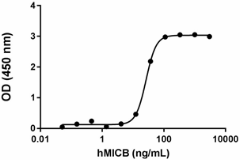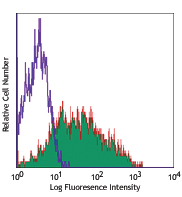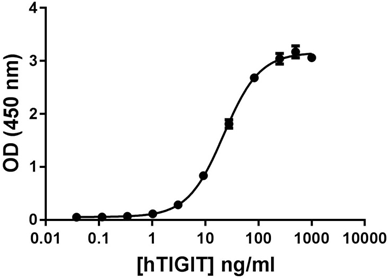- Regulatory Status
- RUO
- Other Names
- Killer cell lectin like receptor K1, KLRK1, KLR, CD314, NKG2-D, NKG2-D-Activating NK Receptor, NKG2-D Type II Integral Membrane Protein, D12S2489E
- Ave. Rating
- Submit a Review
- Product Citations
- publications

-

Immobilized recombinant human NKG2D binds MICB in a dose-dependent manner using a functional ELISA. The ED50 for this effect is 15 – 60 ng/mL. -

Stability Testing for Recombinant Human NKG2D. Recombinant Human NKG2D was aliquoted in PBS, pH 7 at 0.2 mg/mL. One aliquot was frozen and thawed four times (4x Freeze/Thaws) and compared to the control that was kept at 4°C (control). The samples were tested for their ability to bind to recombinant human MICB in a dose-dependent manner using a functional ELISA. The ED50 for this effect is 15 – 60 ng/mL.
Natural killer group 2, member D (NKG2D) is a type II transmembrane protein, a C-type lectin-like receptor that is expressed as a homodimer. NKG2D has a short intracellular domain that possesses charged amino acids that interact with the adaptor proteins DAP10 and/or DAP12 involved in signal transduction. In mice, NKG2D is expressed as two isoforms (long and short) that interact with the adaptor proteins differentially. NKG2D-short interacts with DAP10 and DAP12, and the long isoform interacts only with DAP10. In humans, NK cells express only the NKG2D-long isoform, and therefore DAP10 takes part in the signal transduction. Activation of NKG2D induces secretion of cytokines and chemokines, cytotoxic activity, and proliferation of effector cells. The expression of CEACAM1 on activated NK cells acts as an inhibitory receptor for the NKG2D-mediated cytolysis. The expression of activating receptors NKG2D, NKp30, NKp46, and DNAM-1 is downregulated in peripheral NK cells of patients with gastric cancer. Plasma levels of TGF-β1 are elevated in gastric patients, and it has been described that TGF-β1 can induce the downregulation of NK activating receptors in vitro. Decreased expression of activating receptors in NK cells is associated with gastric cancer progression.
Product DetailsProduct Details
- Source
- Human NKG2D, amino acid Phe78 - Val216 (Accession # P26718) was expressed in CHO cells. The amino terminus contains Met- 6His + GCN4 (LZ) + linker region.
- Molecular Mass
- The 189 amino acid recombinant protein has a predicted molecular mass of approximately 21.6 kD. The DTT-reduced and non-reduced proteins migrate at approximately 27 – 35 kD by SDS-PAGE. The predicted N-terminal amino acid is Met.
- Purity
- >95%, as determined by Coomassie stained SDS-PAGE.
- Formulation
- 0.22 µm filtered protein solution is in PBS pH 7.2.
- Endotoxin Level
- Less than 0.1 EU per µg protein as determined by the LAL method.
- Concentration
- 10 and 25 µg sizes are bottled at 200 µg/mL. 100 µg size and larger sizes are lot-specific and bottled at the concentration indicated on the vial. To obtain lot-specific concentration and expiration, please enter the lot number in our Certificate of Analysis online tool.
- Storage & Handling
- Unopened vial can be stored between 2°C and 8°C for up to 2 weeks, at -20°C for up to six months, or at -70°C or colder until the expiration date. For maximum results, quick spin vial prior to opening. The protein can be aliquoted and stored at -20°C or colder. Stock solutions can also be prepared at 50 - 100 µg/mL in appropriate sterile buffer, carrier protein such as 0.2 - 1% BSA or HSA can be added when preparing the stock solution. Aliquots can be stored between 2°C and 8°C for up to one week and stored at -20°C or colder for up to 3 months. Avoid repeated freeze/thaw cycles.
- Activity
- Immobilized recombinant human NKG2D binds to recombinant human MICB in a dose-dependent manner using a functional ELISA. The ED50 for this effect is 15 – 60 ng/mL.
- Application
-
Bioassay
- Application Notes
-
BioLegend carrier-free recombinant proteins provided in liquid format are shipped on blue ice. Our comparison testing data indicates that when handled and stored as recommended, the liquid format has equal or better stability and shelf-life compared to commercially available lyophilized proteins after reconstitution. Our liquid proteins are verified in-house to maintain activity after shipping on blue ice and are backed by our 100% satisfaction guarantee. If you have any concerns, contact us at tech@biolegend.com.
Antigen Details
- Structure
- Homodimer
- Distribution
-
NK cells, CD8 αβ, T cells, and γδ T cells, invariant NKT (iNKT), innate lymphoid cells (ILCs), and CD4+ T cells under some pathological conditions.
- Function
- NKG2D takes part in the innate immune response. It is induced by IL-15 in intraepithelial lymphocytes and downregulated by virus infection (SV40).
- Interaction
- Gastrointestinal epithelium, stressed airway epithelial cells, fibroblasts, cancer cell lines, cervical cancer, and myelomonocytic leukemia.
- Ligand/Receptor
- MICA, MICB, ULBP ligands (1 to 6), and human cytomegalovirus glycoprotein, UL16.
- Bioactivity
- Recombinant human NKG2D binds recombinant MICB in a dose-dependent manner using a functional ELISA.
- Cell Type
- NK cells, NKT cells, T cells
- Biology Area
- Immunology, Costimulatory Molecules
- Molecular Family
- CD Molecules, Soluble Receptors
- Antigen References
-
- Houchins JP, et al. 1991. J Exp Med. 173:1017.
- Diefenbach A, et al. 2000. Nat Immunol. 1:119.
- Roberts AI, et al., 2001. J Immunol. 167:5527.
- Hosomi S, et al. 2013. Eur J Immunol. 43:2473.
- Klose CSN, et al. 2014. Cell. 157:340.
- Tong HV, et al. 2015. BMC Infect Dis. 15:25.
- Han B, et al. 2018. J Immunol Res. 2018:6248590.
- Stojanovic A, et al. 2018. Frot Immunol. 9:827.
- Gene ID
- 22914 View all products for this Gene ID
- UniProt
- View information about NKG2D on UniProt.org
Related FAQs
- Why choose BioLegend recombinant proteins?
-
• Each lot of product is quality-tested for bioactivity as indicated on the data sheet.
• Greater than 95% Purity or higher, tested on every lot of product.
• 100% Satisfaction Guarantee for quality performance, stability, and consistency.
• Ready-to-use liquid format saves time and reduces challenges associated with reconstitution.
• Bulk and customization available. Contact us.
• Learn more about our Recombinant Proteins. - How does the activity of your recombinant proteins compare to competitors?
-
We quality control each and every lot of recombinant protein. Not only do we check its bioactivity, but we also compare it against other commercially available recombinant proteins. We make sure each recombinant protein’s activity is at least as good as or better than the competition’s. In order to provide you with the best possible product, we ensure that our testing process is rigorous and thorough. If you’re curious and eager to make the switch to BioLegend recombinants, contact your sales representative today!
- What is the specific activity or ED50 of my recombinant protein?
-
The specific activity range of the protein is indicated on the product datasheets. Because the exact activity values on a per unit basis can largely fluctuate depending on a number of factors, including the nature of the assay, cell density, age of cells/passage number, culture media used, and end user technique, the specific activity is best defined as a range and we guarantee the specific activity of all our lots will be within the range indicated on the datasheet. Please note this only applies to recombinants labeled for use in bioassays. ELISA standard recombinant proteins are not recommended for bioassay usage as they are not tested for these applications.
- Have your recombinants been tested for stability?
-
Our testing shows that the recombinant proteins are able to withstand room temperature for a week without losing activity. In addition the recombinant proteins were also found to withstand four cycles of freeze and thaw without losing activity.
- Does specific activity of a recombinant protein vary between lots?
-
Specific activity will vary for each lot and for the type of experiment that is done to validate it, but all passed lots will have activity within the established ED50 range for the product and we guarantee that our products will have lot-to-lot consistency. Please conduct an experiment-specific validation to find the optimal ED50 for your system.
- How do you convert activity as an ED50 in ng/ml to a specific activity in Units/mg?
-
Use formula Specific activity (Units/mg) = 10^6/ ED50 (ng/mL)
 Login / Register
Login / Register 












Follow Us